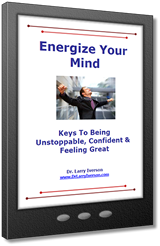Using your Brain Effectively (Part 2)
Order and download this entire eight-part audio program.
(…continued from last week)
More Than Genetics
The first writings on the brain were in China, approximately 2000 BC. Both Socrates and Aristotle contemplated the brain and its totality of function. Leonardo da Vinci, during the renaissance began to discuss how the brain and the body worked together.
Beginning in the early 1800s, medicine was advancing rapidly and people began to wonder about the brain, body, mind continuum and overall health. Towards the end of 1800s many different people; both philosophers and doctors, began to look at how can we better access and use the brain’s potential to expand knowledge, boost health, and overall create a more effective life.
Learn how to direct your mind and emotions so you begin living the life you desire.
Learn more »
In 1933 Harvard University began a study of adult development and the mind-body connection. It is one of the longest most comprehensive studies ever done. They studied more than 800 men and women and followed them from adolescence into old age. They were seeking clues on the mind and body connection and the mind/body interaction for generating a happier, healthier, longer life.
The results haven’t always been what investigators had expected. They hoped that longevity of parents would equal greater longevity for the children. Or that if you always ate well that that would make a difference. Psychiatrist George Vaillant, most recent director of the Harvard study, and in depth analyst of the overall results said, “I’m surprised at some of the things that made a difference and things that did not.”
“Overall it’s a matter of the entire picture and not just one little thing that makes a difference. Surprisingly; stressful events can usually be a predictor of long term health issues, but in this study they were not always. Some people had lots of stress but they aged well. What we’re finding is they did some things to help out and overcome stress responses that other people didn’t.”
Learn to Chill Out a Bit
Obsessing about your cholesterol level or worrying about the genetic hand that you were dealt is a waste of time usually. What the Harvard study found overall, was that there were predictors that could make a difference when observing people going from adolescence up into their late 70s and 80s:
There were some commonalities or things that made a difference within those that aged well who were followed in this long-range study. They tended to avoid smoking, have good coping skills, have a make lemonade out of lemons attitude, keep a healthy weight–not over nor under a certain amount, exercise regularly, make sure you get a little bit of exercise every day, have good strong social relationships, hopefully including a stable marriage or a committed relationship, use your brain and get an upper level education, and ongoingly for your entire life keep on learning new things.
Much is in Your Control
Dr. Vaillant said it’s astonishing how many things that predict longevity are within our control. One of the things that he has studied and been researching most recently is aging and having friends. He said, “It’s something like being tickled–it’s achieved best when you have another person doing it.”
Whether it’s your social connections with your spouse, with your offspring, with siblings, with card playing friends, with people you go to sporting events with, with church going friends; all of those are crucial to good health while growing older.
It was noticed that those people who were happy, engaged participants, often around other people–whether it was having friends over for dinner, interacting with children or grandchildren, doing functions outside–tended to live in the present and enjoyed their life right now. It’s great to have to have plans for the future, but you have to live in the present and take action right now.
Other studies have been confirming what Dr. Vaillant and the Harvard research are showing. At UCLA School of Medicine Department of Geriatrics, Teresa Seeman PhD, evaluated adults in their 70s over a 7 year period. She found that those people with satisfying social relationships, whether with their significant other and/or with friends, remained more mentally alert over the course of the study with less age related mental decline and better overall physical health.
(to be continued…)
Has this program caught your interest? Just can’t wait to hear the next segment? Or perhaps you’d like to download the entire program to your phone or tablet and listen during your travels? You can purchase and immediately receive this entire program as a digital download. You will receive all of the audio segments, plus a 33 page PDF transcript! Order Now: Using your Brain Effectively
 Energize Your Mind
Energize Your MindKeys To Being Unstoppable, Confident & Feeling Great! This eBook and Audio program contains strategies that increase your mental control and help you achieve your goals. Learn how to direct your mind and emotions so you begin living the life you desire. You’ll learn in detail, how you can make rapid, positive changes in your life. Learn proven strategies that have helped thousands. You’ll know methods for improving your health and increasing your physical energy, how to give your career and income a boost, methods for overcoming emotional barriers that can block you, and more.
Posted: August 10th, 2016 under Audio Programs.
Tags: better health, brain potential, cholesterol, happy, how to live longer, Leonardo da Vinci, longevity, mentally alert, mind body connection, mind-body, Socrates, stress, worry







